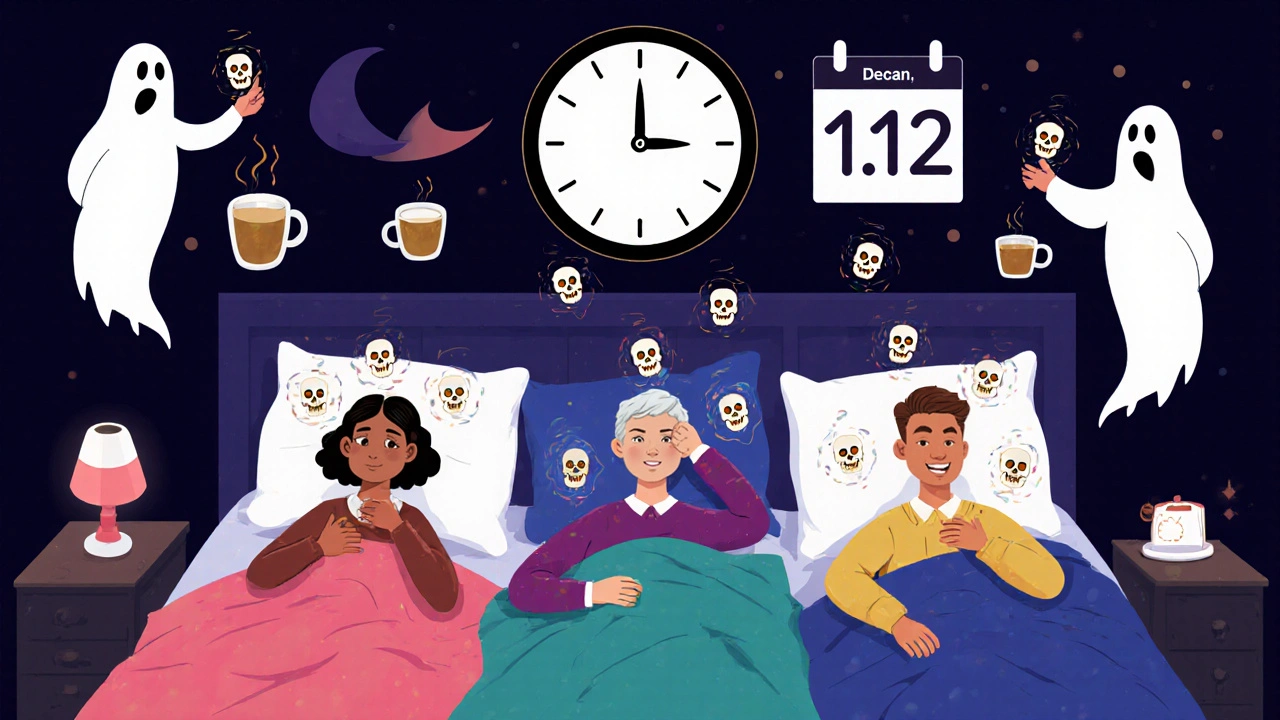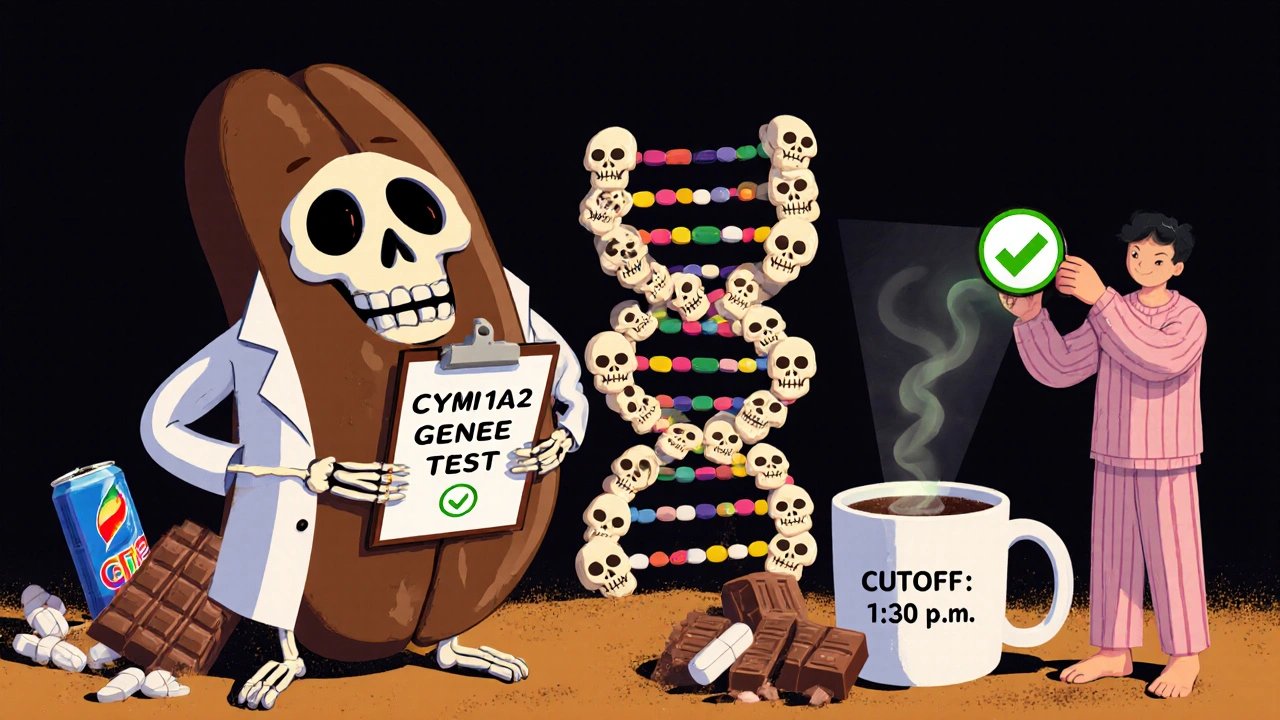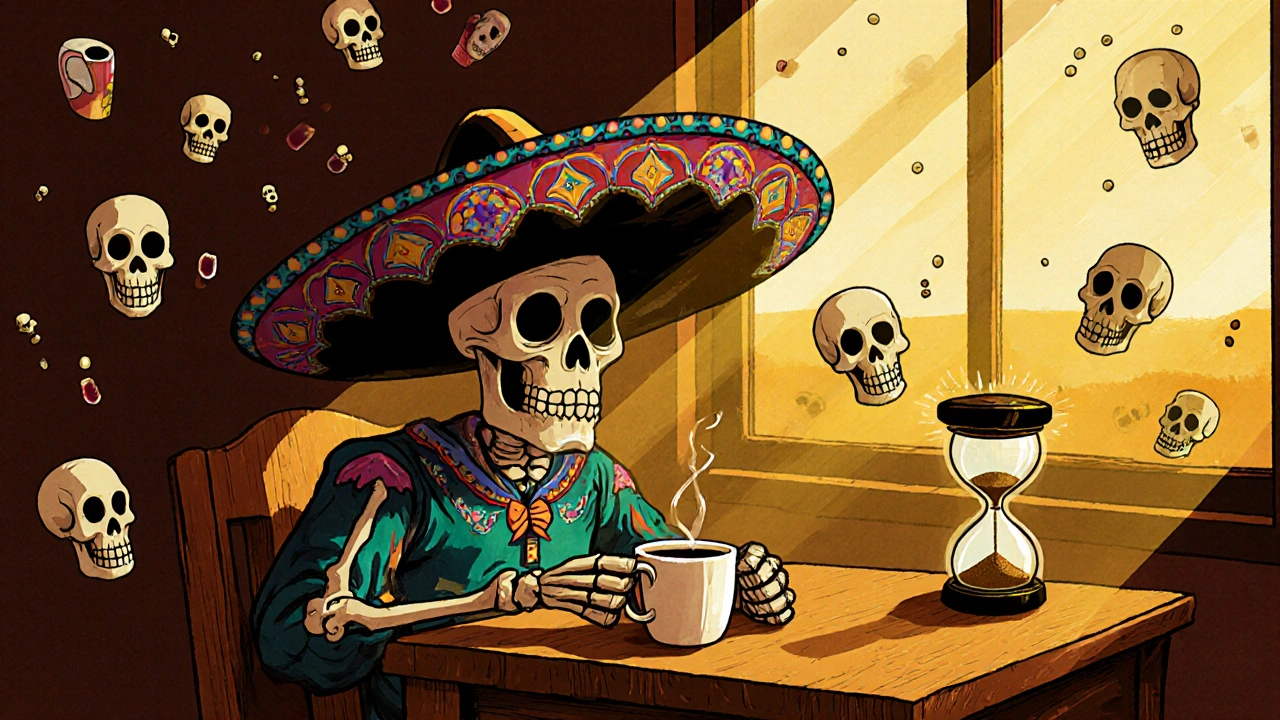How many times have you lain in bed at night, wide awake, wondering why you can’t fall asleep-even though you didn’t do anything exciting that day? If you had a coffee after 2 p.m., that’s probably why. Caffeine doesn’t just give you a buzz-it lingers in your system long after you’ve finished your cup. And if you’re still drinking it close to bedtime, you’re sabotaging your sleep without even realizing it.
Why Caffeine Keeps You Awake
Caffeine works by blocking adenosine, a chemical in your brain that builds up the longer you’re awake and tells you it’s time to sleep. Think of adenosine like a sleepy signal. Caffeine looks so much like adenosine that it sneaks into the same receptors, tricking your brain into staying alert. That’s why you feel wired-even if you’re tired.
The effects start in about 30 minutes and can last for hours. But here’s the catch: caffeine doesn’t just disappear when you feel its effects fade. Its half-life-the time it takes for half the caffeine to leave your body-is 4 to 6 hours on average. For some people, it’s longer. That means if you drink a cup of coffee at 4 p.m., you still have half that caffeine in your system at 8 p.m., and a quarter of it still hanging around at midnight.
The 8-Hour Rule: What the Science Says
For years, people were told to stop caffeine by 6 p.m. But newer research shows that’s not enough. A 2021 review of 24 studies published in Sleep Medicine Reviews found that to truly protect your sleep, you need to cut off caffeine at least 8.8 hours before bed.
That’s not a guess. It’s based on real data. One standard 8-ounce cup of coffee contains about 107 mg of caffeine. To let your body clear that amount without disrupting sleep, you need nearly 9 hours. If you go to bed at 10 p.m., that means your last cup should be no later than 1:12 p.m.
And it’s not just about falling asleep. The same study showed caffeine reduces total sleep time by 45 minutes, lowers sleep efficiency by 7%, and pushes back how long it takes to fall asleep by 9 minutes. Even if you do fall asleep, your deep sleep-where your body repairs itself-gets cut short.
Not All Caffeine Is the Same
Not every drink with caffeine affects you the same way. Here’s what you’re really consuming:
- Standard coffee (8 oz): 107 mg → needs 8.8-hour cutoff
- Espresso (1 shot): 63 mg → needs about 5.2 hours
- Black tea (8 oz): 47 mg → no clear cutoff, but still impacts sleep
- Energy drinks (8.4 oz Red Bull): 80 mg → needs 7.5+ hours
- Pre-workout supplements: up to 217.5 mg → needs 13.2 hours
- Excedrin (one tablet): 65 mg → often forgotten, but still counts
Most people don’t realize how much caffeine is in their pre-workout powder or pain relievers. If you’re taking those in the afternoon, you’re adding hidden caffeine to your system. That’s why so many people think they’re following the rules but still can’t sleep.

Age and Genetics Matter
Not everyone processes caffeine the same. Your genes play a big role. The CYP1A2 gene controls how fast your liver breaks down caffeine. About half of people have a version that metabolizes it slowly. For them, caffeine can stay in the system for up to 12 hours.
And age matters too. A 2025 study in Nature Communications found that people between 41 and 58 are more sensitive to caffeine’s sleep-disrupting effects than younger adults. Even small amounts in the afternoon can throw off their sleep cycle.
If you’re over 40 and still drinking coffee after 2 p.m., you’re likely paying for it in sleep quality-even if you don’t notice it right away.
Real People, Real Results
Thousands of people have tested this. In a 2022 survey of over 2,000 users by Sleepopolis, those who stopped caffeine by 2 p.m. got 47 extra minutes of sleep per night and had 8% higher sleep efficiency than those who drank it until 4 p.m.
One Reddit user, u/CaffeineStruggles, wrote: “I switched from my last coffee at 4 p.m. to 2 p.m. and gained almost an hour of sleep quality. It was eye-opening.”
Another analysis of 15,328 sleep logs from the Sleep Cycle app showed that people who followed the 8-hour cutoff reported 82% satisfaction with their sleep. Those who only waited 4 hours? Only 47% were satisfied.
The difference isn’t subtle. It’s measurable, repeatable, and life-changing.
How to Actually Stick to a Cutoff Time
Knowing when to stop is one thing. Actually doing it is another. Here’s how to make it stick:
- Track your intake. Use an app like Caffeine Zone or MyFitnessPal to log every cup, soda, or pill. You’ll be surprised how quickly it adds up.
- Switch to half-caf after noon. A 2022 review in the American Journal of Managed Care found this cuts sleep disruption by 32% compared to full-strength afternoon coffee.
- Try decaf after 2 p.m. Starbucks’ “Evening Brew” decaf coffee captured 15% of the after-4-p.m. market in just six months-because people are hungry for a real alternative.
- Set a phone alarm. Mark your calendar or set a reminder: “Caffeine cutoff: 1:30 p.m.” Treat it like a doctor’s appointment.
- Test it for two weeks. Give yourself a clean slate. No caffeine after 2 p.m. for 14 days. Then check your sleep logs. You’ll know right away if it’s working.

What About Tea and Chocolate?
Black tea has less caffeine than coffee, but it’s still there. If you’re sensitive, even one cup after 3 p.m. can delay your sleep onset. Green tea has even less, but it still contains enough to interfere if you’re a slow metabolizer.
Dark chocolate? A 1-ounce bar has about 20 mg of caffeine. That’s not much-but if you’re eating it after dinner, it’s still adding up. And let’s not forget chocolate-flavored protein bars, energy gels, and even some supplements.
If you’re serious about sleep, treat all caffeine the same-no exceptions.
The Future: Personalized Cutoffs
Soon, your caffeine cutoff won’t be based on guesswork. Companies like 23andMe now offer genetic tests that tell you if you’re a fast or slow caffeine metabolizer. A 2024 study showed that combining genetic data with age and sleep history lets algorithms predict your ideal cutoff time with 89% accuracy.
Wearables like Oura Ring and Fitbit already adjust sleep recommendations based on your caffeine intake. In 2025, the American Academy of Sleep Medicine will update its guidelines to include beverage-specific cutoffs-finally moving beyond vague advice like “avoid caffeine late in the day.”
This isn’t science fiction. It’s happening now. And the people who adapt first will sleep better, longer, and deeper.
What If You Can’t Quit?
Some people just can’t give up their afternoon coffee. That’s okay. But you need to know the trade-off.
If you drink caffeine after 2 p.m., you’re not just losing sleep-you’re losing the restorative parts of sleep. That means less muscle repair, weaker memory consolidation, and higher stress hormones the next day. Over time, that adds up.
Instead of quitting cold turkey, try this: reduce your afternoon cup by half. Swap one regular coffee for half-caf. Or move it to 1 p.m. instead of 3 p.m. Small changes make big differences.
And remember: it’s not about perfection. It’s about progress. One day without late caffeine is better than zero.
What time should I stop drinking coffee to sleep better?
To optimize sleep onset, stop consuming caffeine at least 8.8 hours before bedtime. For most people who go to bed around 10 p.m., that means cutting off coffee by 1:12 p.m. This accounts for the average 4-6 hour half-life of caffeine and ensures most of it is cleared from your system before sleep.
Does decaf coffee have caffeine?
Yes, decaf coffee still contains a small amount of caffeine-about 2 to 5 mg per 8-ounce cup. That’s not enough to disrupt sleep for most people, but if you’re extremely sensitive or a slow metabolizer, even that tiny amount can add up, especially if you drink multiple cups. For optimal sleep, treat decaf as a safer alternative, not a completely caffeine-free one.
Can I drink tea in the afternoon without affecting sleep?
Black tea has about half the caffeine of coffee (around 47 mg per 8 oz), so it’s less disruptive-but not harmless. If you’re sensitive or over 40, drinking black tea after 3 p.m. can still delay sleep onset and reduce deep sleep. Green tea has even less, but it’s not zero. If you want guaranteed sleep quality, switch to herbal teas like chamomile or peppermint after noon.
Why do I still feel tired even after 8 hours of sleep?
Caffeine can reduce sleep efficiency by up to 7%, meaning you’re spending more time awake in bed even if you’re lying there for 8 hours. You might be getting enough hours, but not enough quality sleep. Deep sleep and REM cycles get shortened, leaving you feeling unrested. Cutting caffeine earlier in the day can restore sleep quality without adding more hours.
Are energy drinks worse than coffee for sleep?
Yes, significantly. A typical energy drink contains 80-150 mg of caffeine per serving-sometimes more. Pre-workout supplements can have over 200 mg. That means you need a 13-hour cutoff, not 8. If you drink one at 3 p.m., you’re still half-caffeinated at 3 a.m. That’s why people who rely on energy drinks often report chronic sleep problems, even if they don’t drink coffee.
Can I use melatonin to fix sleep disrupted by caffeine?
Melatonin helps regulate your sleep-wake cycle, but it doesn’t cancel out caffeine. If caffeine is still in your system blocking adenosine receptors, melatonin won’t override that. It’s like trying to turn off a light with a dimmer while someone keeps flipping the switch. The best fix is to stop caffeine earlier-not to mask the problem with supplements.
Is it true that some people can drink coffee at night and still sleep fine?
Some people claim they can, but studies show they’re often wrong. Even if they fall asleep quickly, their brain activity during sleep is altered-less deep sleep, more light sleep. Most people who think they’re unaffected are just used to being tired. Objective sleep trackers confirm reduced sleep efficiency and disrupted brain waves. Genetic testing reveals many of them are fast metabolizers-but even they lose sleep quality.


Cris Ceceris
November 10, 2025 AT 21:02so i tried cutting coffee after 2 p.m. for two weeks and honestly? my sleep didn’t just improve-it became the kind of deep, dumb, unbothered sleep i forgot existed. no more 3 a.m. staring at the ceiling wondering if my cat hates me. just... silence. and i didn’t even miss the afternoon buzz.
Brad Seymour
November 11, 2025 AT 04:07but what if you work late shifts? or you’re a nurse on night rotation? the 8.8-hour rule sounds great until your body’s clock is inverted. i drink coffee at 1 a.m. and sleep at 8 a.m.-and i’m fine. biology isn’t one-size-fits-all.
Malia Blom
November 12, 2025 AT 02:28ok but have you considered that maybe your sleep issues aren’t caffeine? maybe it’s your phone, your anxiety, your existential dread, or the fact that you’re 37 and your body is slowly turning into a wet sock? caffeine’s just the scapegoat for modern life’s collapse.
Erika Puhan
November 13, 2025 AT 05:31the 8.8-hour cutoff is statistically significant but clinically irrelevant. you’re ignoring circadian variability, metabolic heterogeneity, and the placebo effect of behavioral compliance. also, decaf is a corporate scam to monetize guilt.
Edward Weaver
November 14, 2025 AT 09:10if you’re american and still drinking coffee after 2 p.m., you’re just lazy. in germany, they stop at noon. in japan, they drink matcha at 10 a.m. and call it a day. we’re not all weak. get your discipline up.
Lexi Brinkley
November 14, 2025 AT 09:36omg i switched to decaf after 2 and now i sleep like a baby 🤍✨ my partner says i stopped snoring too?? is this real life??
Kelsey Veg
November 15, 2025 AT 11:40the whole 8.8 hour thing is bs i tried it and still woke up at 3am so maybe its not the coffee its just me being a mess lol
Alex Harrison
November 16, 2025 AT 06:03i’ve been doing the 2 p.m. cutoff for six months now. i used to think i was fine with late coffee but my sleep tracker showed i was missing 30+ minutes of deep sleep every night. it’s not magic-it’s math. and the difference in my focus at work? night and day.
Jay Wallace
November 16, 2025 AT 10:55you’re all missing the point: the real issue is not caffeine-it’s the pathetic decline of american work ethic. if you can’t handle one cup of coffee without your nervous system imploding, maybe you shouldn’t be working at all. my grandfather drank espresso at midnight and punched a clock at 5 a.m. every day. we’re soft.
Alyssa Fisher
November 18, 2025 AT 08:30the genetic component is fascinating. i got my 23andMe results and turns out i’m a slow metabolizer-so i’ve been cutting off caffeine at noon for a year. i didn’t realize how much my afternoon brain fog was from coffee, not just aging. it’s wild how much of what we think is ‘normal tiredness’ is just accumulated caffeine residue.
Alyssa Salazar
November 18, 2025 AT 19:11the pre-workout thing is wild. i didn’t even know my protein bar had 70mg of caffeine. i thought i was being healthy. turns out i was basically doping myself at 3 p.m. and wondering why i couldn’t sleep. now i read labels like my life depends on it. because it does.
Beth Banham
November 19, 2025 AT 12:16i stopped coffee after 1 p.m. last month. i didn’t expect much. but now i wake up without an alarm. not because i’m tired-because i’m actually rested. weird, right? sometimes the simplest fixes are the ones we ignore the longest.
Brierly Davis
November 21, 2025 AT 04:12if you’re struggling with this, start small. one day a week, no caffeine after 2. then two days. then five. it’s not about being perfect-it’s about being consistent. and hey, if you need a treat after lunch, try a warm herbal tea with a splash of oat milk. it’s cozy, it’s calm, and your future self will thank you. 🙏☕
Amber O'Sullivan
November 22, 2025 AT 09:37so you're saying if i drink tea at 3pm i'm basically sabotaging my sleep? but what about the ritual? the calm? the quiet moment before dinner? you can't just take that away. i'm not a machine
Key Davis
November 23, 2025 AT 16:52While I appreciate the data-driven approach outlined here, I must emphasize the importance of individualized sleep hygiene. The 8.8-hour cutoff, while statistically robust, does not account for cultural, occupational, or physiological diversity. For example, in many Mediterranean and Latin American societies, afternoon caffeine consumption is deeply embedded in social rhythm and does not correlate with sleep disruption in those populations. This suggests that context, not just chemistry, governs outcomes. Furthermore, the emphasis on quantification risks reducing a deeply personal experience-sleep-to a metric. I urge readers to observe their own patterns, not merely follow algorithms.